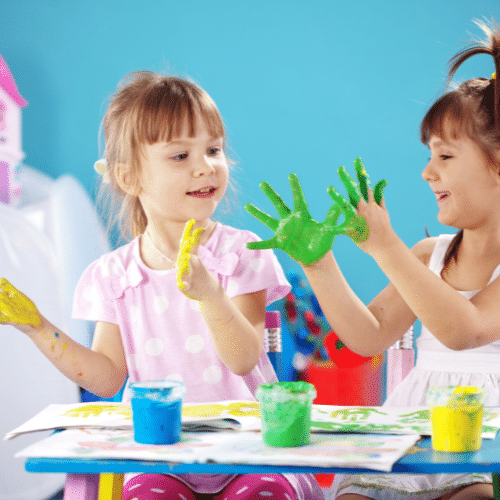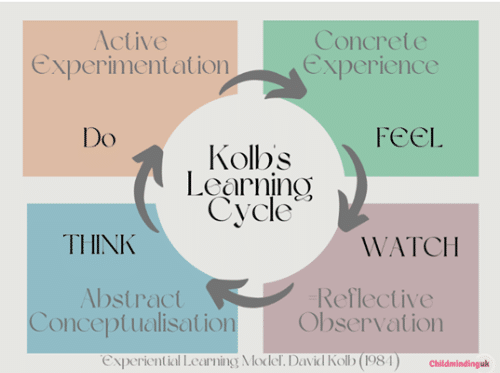Why is Continued Professional Development Important?
3rd April 2023
Share this entry:
Childminding UK has been supporting childminders for over 30 years. Formed in 1991 by and for local working childminders in Northamptonshire, we now support childminders across the country. A registered charity, we are the only national organisation that solely supports childminders and we have recently achieved the Princess Royal Training Award for ‘Ensuring high quality childcare through training and support’. All staff are experienced childcare professionals, and have been childminders themselves and our trustees are working childminders or have knowledge of childminding, so we have a good understanding of the sector. We often get asked about what training childminding professionals have to do once they are registered with Ofsted. The straightforward answer would be to highlight the statutory training within Safeguarding, Paediatric First Aid and Food Hygiene (as required) but in reality it is much more broad than that.
What is Continued Professional Development (CPD)?
You may not have come across this term before however, it is likely that you have been involved in it during your career. It is easy to think that CPD is just about training but in reality is it so much more; it is all the different things that you do to develop your knowledge and understanding such as:
• Attending training and mentoring. Childminders may not work directly with others, however organising to co-observe local colleagues and holding professional discussions with them are both valuable exercises to develop practice. Naturally this is potentially more straightforward in larger settings to organise and would certainly be seen as good practice to do;
• Online meetings with your Local Authority or other training providers;
• Reading early years based books, magazines and blogs;
• Attending conferences and other training events;
• Completing accreditation programmes or training courses;
• Exploring educational theorists to understand better the reason why certain practice is recommended;
• Signing up for updates from organisations such as Ofsted, your Local Children’s Safeguarding Board, NSPCC and your membership organisation etc to make sure that you stay up to date with legislative changes or any themes that may be developing over time.
Do Early Years Practitioners and Childminders need to complete CPD
For those starting out in their career in the early years, or changing roles within the sector perhaps, it is a requirement that certain levels of sector based qualifications have been achieved by practitioners working in larger setting, and childminders are required to carry out introductory training to ensure that they are ready to start their new business. This initial training is required to set the standards of what is expected to keep children safe, and to be able to provide appropriate levels of teaching and learning as per the expectations of the Early Years Foundation Stage framework. As part of that initial training, all members of staff and childminders will complete mandatory training in Safeguarding (including Safeguarding Lead for Childminders and leaders) and Paediatric First Aid as mentioned already. In larger settings (and good practice for childminders) all practitioners that are involved in the preparation and handling of food should also have training in Food Hygiene.
Beyond that, other than statutory training (Safeguarding, First Aid and Food Hygiene as required) there are no set requirements to submit CPD hours on an annual basis as there are in other industries. However Ofsted does expect all practitioners to be dedicating time and energy to continuing to improve and extend their understanding and skill set. Point 3.21 in the Early Years Foundation Stage framework states:
‘Providers must support staff to undertake appropriate training and professional development opportunities to ensure they offer quality learning and development experiences for children that continually improves.’
In larger settings, training will be issued by the management team and individual practitioners can also give ideas for potential training as part of their personal development plan. Childminders are responsible for establishing the CPD needs for themselves and for any assistants that they may work with. All training and development is likely to come with a cost in some way either financial or time. So when considering the CPD that you want to do either as an individual business or as part of a team, it is useful to consider what value it will put back into the business and how it will impact on the children that you work with.
The Value of Continued Professional Development
CPD is incredibly valuable for a range of reasons, for all early years practitioners. There is a wealth of training available to people that are interested in learning more or strengthening knowledge about a whole range of subject areas, and to suit most preferred teaching and learning ethos. If we think about what value CPD offers practitioners, we might consider;
• Being able to consolidate and extend current understanding and skills;
• To introduce and develop practice based on new understanding and skills;
• To demonstrate continued learning to leaders or to Ofsted;
• To increase standards, to raise confidence, and to validate practice;
• Enabling career progression by increasing or extending your qualification level and type.
• To enable future planning, both of CPD and the children’s learning and experience.
It is key to keep in mind that the more CPD you do, it is likely that you will be more inspired to come up with and try new ideas. You will be able to observe the impact for the children giving you an opportunity to validate your practice and make you feel good and stimulate new idea to try. Then the learning cycle continues!
When planning CPD you should consider:
• What you want to do and why, and how you anticipate it is going to support and develop practice, the children’s experience or how the business is managed etc,
• How are you going to be able to get access to the training and carry it out,
• nd then evaluate how the training has actually impacted.
You can consider Ofsted’s principles of the 3 ‘I’s’ when planning teaching and learning with the children, as a reminder of how to reflect on your own development – Intent, Implement, Impact. It will serve as an excellent way of carrying out reflective self-evaluation of your business as well as being able to explain it in terms that are relevant. Ofsted has no requirement for a specific written self-evaluation, but producing a review of your CPD will show how you are considering and reflecting on the business, the children’s development and what themes sit behind future plans.
To finish this blog, I wanted to share this quote by W.B. Yeats which I think is a wonderful way to consider your practice with the children, but also how you should take control of and look after your own development as professionals:
“ Education is not the filling of a pot but the lighting of a fire”
To find out more about Childminding UK or to get in touch – childmindinguk.com
Why attend Childcare & Education Expo?
Join over 2,500 like-minded individuals from the early years & primary sector who are dedicated to improving their practice and their education settings.
Attend educational seminars and panel discussions to credit your CPD
Meet the experts to have your questions answered
Receive fantastic onsite offers and discounts
Experience expert-led informative hands-on workshops
Network with peers and industry players
Pick up hundreds of new products, resources, ideas and services
And most of all, enjoy a great day out with your colleagues






